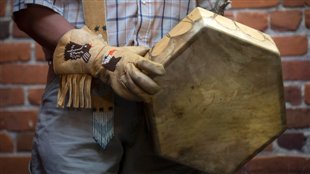This week Carmel Kilkenny and Lynn Desjardins are your hosts.
Ocean Woes
We begin with the state of the world’s oceans. A panel made up of former world leaders and international organizations issued a dire warning this week.

They said the health of the world’s oceans is in a dangerous decline and we have only five years to do something about it.
After 18 months of investigation, the Global Ocean Commission says the world needs to come up with an integrated rescue package to save the seas.
Lynn Desjardins spoke with former Canadian Prime Minister Paul Martin, now one of the commissioners, to find out more.
American Apparel
One of the major business stories this week was the shake-up at American Apparel. The men’s and women’s retail outlet, opened in 1998 by Canadian Dov Charney, is now embroiled in a power struggle.

In a statement released on June 18th, the board of directors said it voted to oust Charney as the result of an “investigation into alleged misconduct.”
Now, with 249 stores in 20 countries, and about 10,000 employees, the Los Angeles-based company is facing daunting financial challenges.
Dov Charney, born and raised in Montreal, boasted of a sweatshop-free environment, but he has been the subject of rumours and controversy due to both the clothing chain’s provocative advertising campaigns, and his reportedly outrageous behavior with female employees.
Charney is fighting to be reinstated. Carmel Kilkenny spoke with Concordia University Marketing Professor Robert Soroka, to find out what his chances might be.
Landmark Ruling for First Nations
Canada’s Supreme Court delivered a historic ruling on Thursday affecting aboriginal land rights. One that will have wide-ranging repercussions for Canada’s First Nations, resource companies, and Canada’s economy.
The unanimous decision will essentially make it easier for First Nations to establish title over broad tracts of land that are regularly used for hunting, fishing and other activities.

he Tsilhqot’in First Nation, a semi-nomadic group of six bands, celebrated a historic Supreme Court of Canada win on Thursday, but the decision’s consequences go well beyond the community. (Darryl Dyck/Canadian Press)
This is the first time the Supreme Court has recognized aboriginal title to a specific piece of land.
Following the ruling, Stewart Phillip, president of the Union of British Columbia Indian Chiefs, spoke to the media.
Employers helping the Sandwich Generation
With the exception of some new Canadians, most adults don’t live with their parents.

As their mothers and fathers get older they often need more care at home and more help getting to appointments. But people find it difficult to provide that help, and work full time.
It’s a problem that employers need to address, in the view of the Canadian government, which has created a special panel to come up with ideas.
Lynn Desjardins spoke with an expert adviser to the panel, Janice Keefe, a professor of gerontology at Mount Sinai University.







For reasons beyond our control, and for an undetermined period of time, our comment section is now closed. However, our social networks remain open to your contributions.